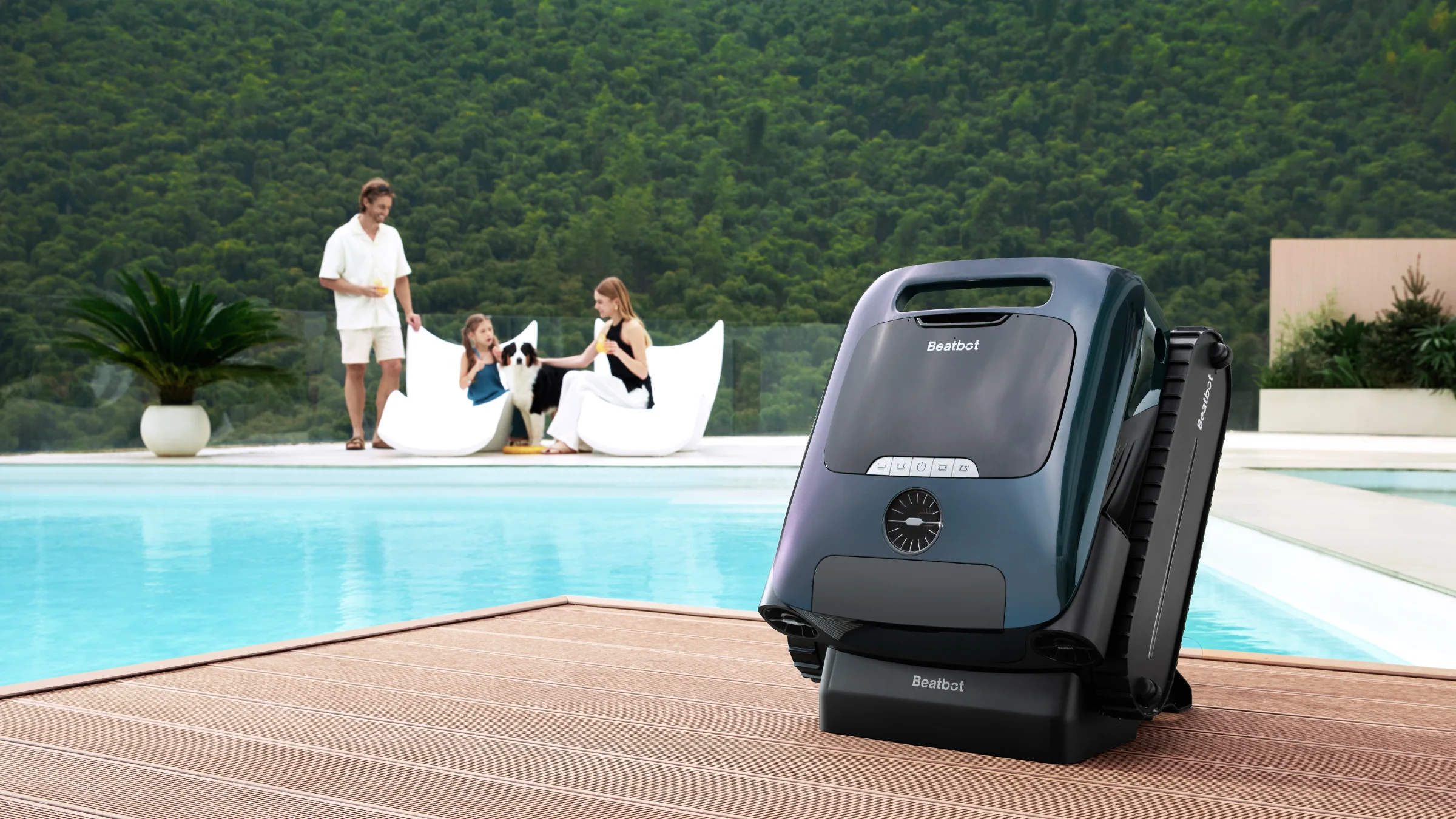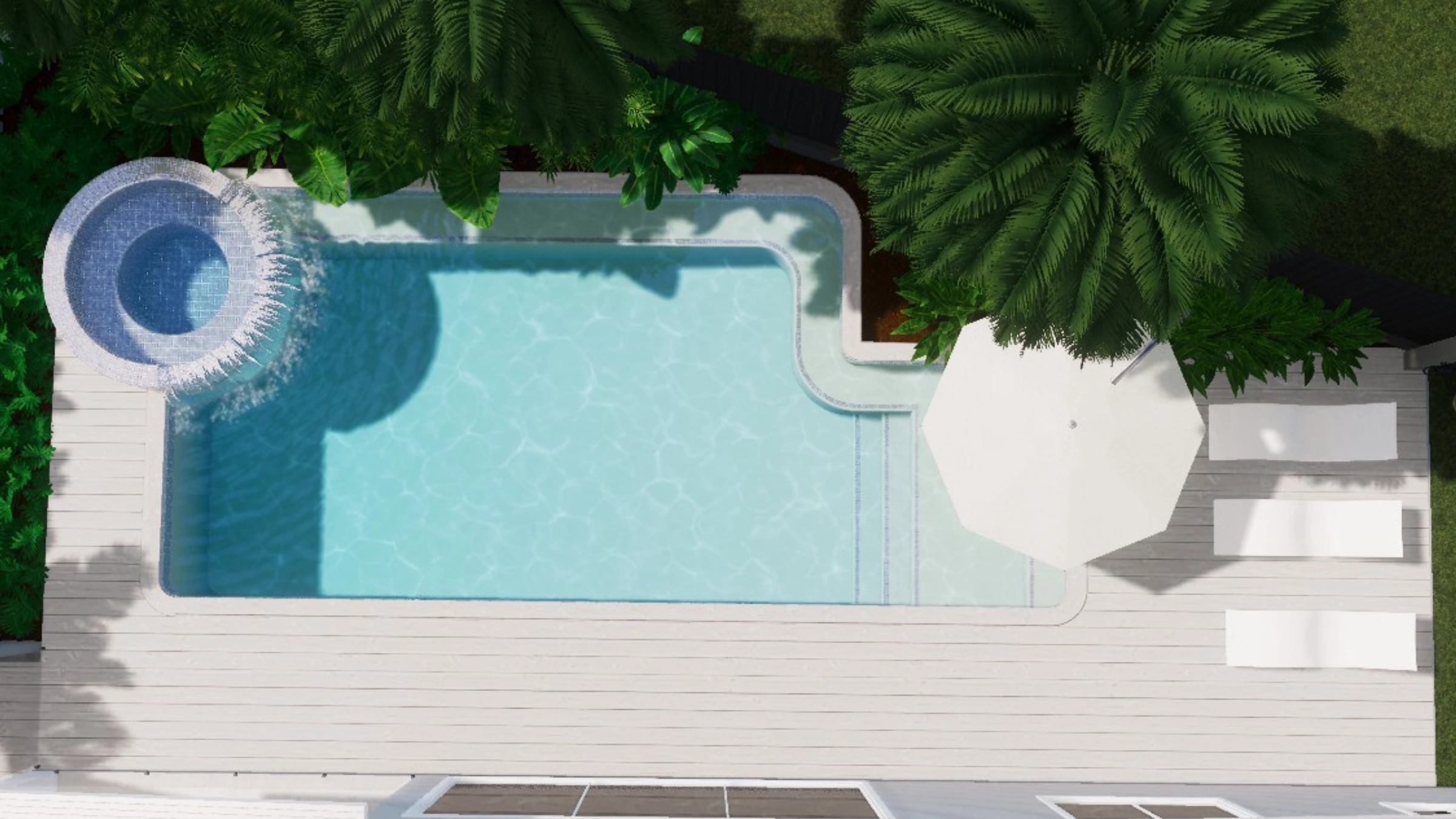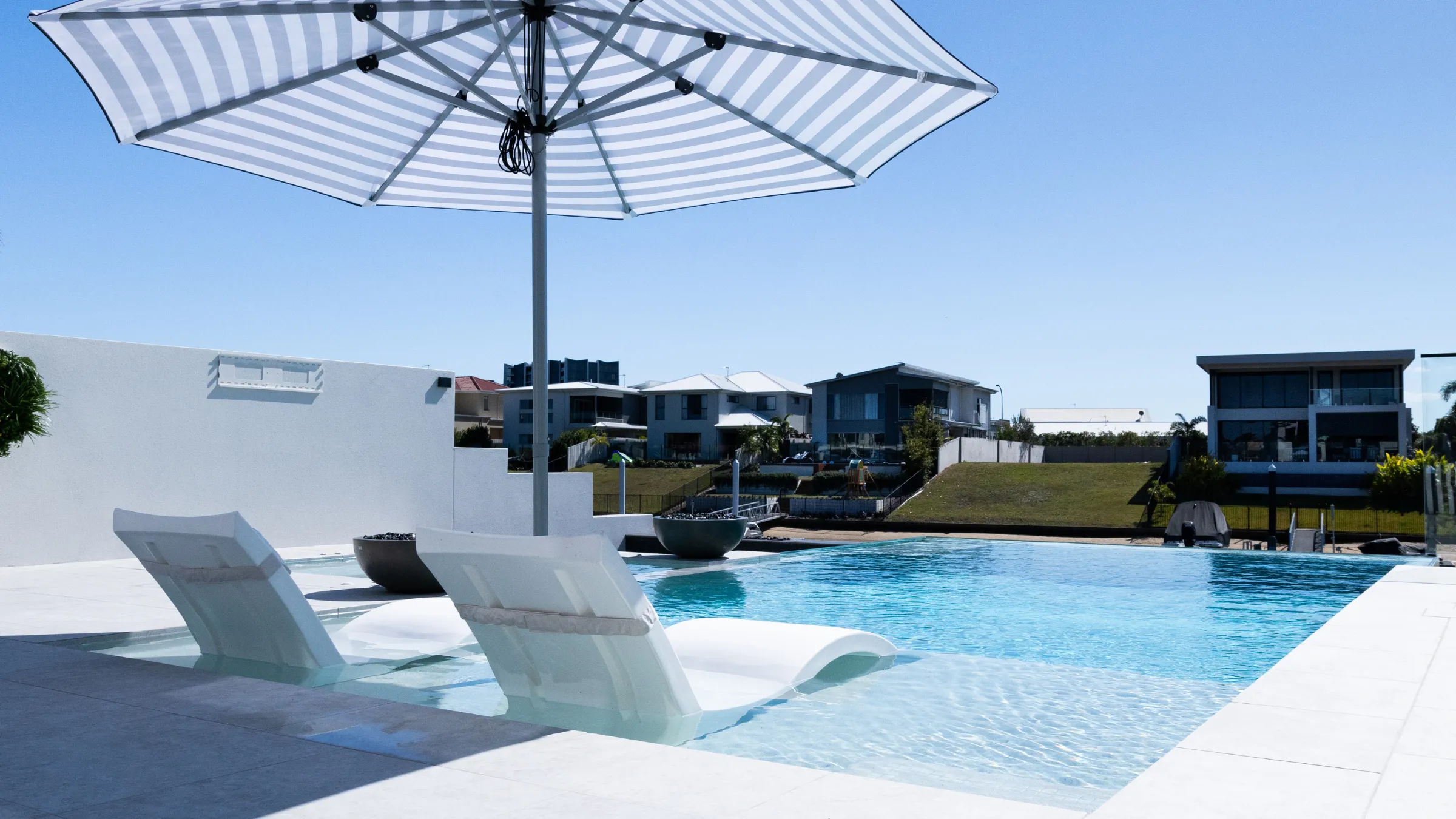In this article our well versed guru, Rhiannon Royall from Poolz, talks potential pool owners through safety measures, pool fencing/pool barriers, the pool's equipment, maintenance costs, and how to do a comprehensive assessment. So current homeowners know what they are in for with detailed information to make an informed decision. Rhiannon has more than 25 years experience in the swimming pool industry, in everything from spas to fibreglass and luxury concrete pools. Whether it's an inground pool or an above ground pool.

5 Things every home-owner can do themselves to avoid buying a problematic swimming pool
Investing in a property with a pool area is an exciting prospect, however, it's crucial for home buyers to exercise caution and diligence when assessing properties with pools to avoid potential safety hazards and costly issues.

- Check the pool lights are in working order: they can be expensive to replace.
- Check the pool is level: simply measure the distance from the water to the top of the pool shell (directly under the first row of tiling) to ensure it is the same on all sides of the pool. If the pool is not level, it could indicate structural issues and that the pool was installed incorrectly or is sinking at one end.
- Check the waterline of the pool: inspect the waterline area all the way around to look for signs of degradation that may indicate a significant cosmetic renovation will be required. On a concrete pool, this means inspecting the waterline tiles or the pebble to see if any tiles are cracked or missing, and on a fibreglass pool this means ensuring that any white residue can easily be wiped away.
- Inspect the coping tiles around the pool (the first row of tiles around the pool edge): coping tiles are supported by the pool shell and are part of the shell structure, so any cracks or level changes could indicate issues with the pool shell itself.
- Check the filtration station: check for signs of leaks and wear and tear. Most will have a sticker from a pool company that has serviced the equipment. Call that company and ask about the state of the equipment and the pool condition to get an independent opinion. If you hope to install heating, it’s worth checking to see if the pool already has heating provisions or an existing heater installed.
It is absolutely recommended that an independent building inspector performs the usual inspections of the whole swimming pool or spa area and if you have any suspicion of a leak, then getting a professional leak detection service is also recommended. All swimming pool and spa heaters need to be installed on a separate electrical circuit; ensure your building and pest inspector checks this element.

It is worth noting that the cost of a significant pool renovation project, especially when the issues are structural, can be similar to the cost of building a new pool, which is why it is so important to do these checks. Cosmetic renovations are typically not as expensive, but are still tens of thousands of dollars.
Filtration
Freshwater (which are essentially low salt pools) or mineral pools, and salt water pools, are far more popular than chlorine pools these days, so understanding what type of filtration the pool is running and what costs may be associated with its ongoing maintenance and conversion to a newer system is important if you plan to upgrade it in the future.
Age of Pool
The age of the pool is less important than the condition. It’s common for pools to require renovation around the 20 to 25 year mark, however if the pool is very well maintained or has already been renovated, then the age of the pool is not nearly as important as its condition.

Pool Type
If the pool is fibreglass, it would be worth asking the current pool owner for a copy of the pool warranty to assess whether the warranty can be transferred to a a new pool owner. Additionally, some fibreglass pool warranties require strict servicing history and water temperature limits to ensure the warranty is valid.
Home Insurance
If you do purchase the house, make sure your swimming pool alone is included in the purchase of home insurance. If this is missed, it can be a costly mistake.
Inclusions on the contract
Just because you see a robot pool cleaner when you inspect the house, doesn’t mean it will be included at sale. Make sure to itemise all the pool-related inclusions on the house purchase contract so you don’t get any surprises when you take possession of the house.
Pool Safety & Fencing Certification
Check the pool has the required local council inspection and certification, the fencing is compliant with local regulations, and was constructed by a licensed builder. It is also advisable for the home-owner to check the fencing to make sure it is in good condition, stable and the gate is self-closing, in line with regulations.

Assessing the Swimming Pools Condition
When evaluating a pool, home buyers should pay attention to several key factors to determine its working order and ask questions about:
Structural Integrity: Ask to inspect the the pool area's walls, floor, and coping for cracks, leaks, or signs of damage. Any structural issues could indicate underlying problems that may require costly repairs.
Filtration System: Ask about the age and the condition of the pool pump, filter, and other filtration equipment. Listen for unusual noises or vibrations, which may signal malfunctioning components. Additionally, ensure that the filtration system is properly sized for the pool's volume to maintain the safety standards for water clarity and sanitation.

Water Quality: Ask for a test of the pool water for pH levels, chlorine or salt content, and clarity. Cloudy or discoloured water could indicate poor maintenance or inadequate sanitation, potentially posing health risks to swimmers.
Decking and Surroundings: Inspect the area surrounding the pool for signs of water damage, such as rotting wood or cracked concrete. Proper drainage and landscaping are essential to prevent water from pooling around the pool, which could lead to structural damage over time.
Maintenance History
To gauge the pool's maintenance history, buyers should:
Request Documentation: Ask the seller for records of regular pool maintenance, including cleaning schedules, chemical treatments, and repairs. A well-documented maintenance history indicates that the pool has been cared for properly, reducing the likelihood of unexpected issues.
Inspect Pool Equipment: Examine the condition of the pool equipment, such as the pump, filter, and heating system. Well-maintained equipment is less likely to malfunction and may have a longer lifespan.
Seek Professional Inspection: Consider a good investment in hiring a qualified pool inspector to assess the condition of the pool thoroughly. An expert pool inspection can uncover hidden problems and provide other valuable information and insights into the pool's maintenance needs.

Money Traps to Avoid
Buyers should be aware of potential money traps associated with purchasing a home with a pool:
Hidden Repairs: Structural issues, equipment failures, or leaks can lead to costly repairs that may not be necessary repairs or be immediately apparent during the home inspection. Budget for potential repair expenses to avoid financial strain down the line.
High Operating Costs: Pools require regular maintenance, including chemical treatments, cleaning, and energy costs for running equipment. Factor these ongoing expenses into your budget to ensure you can afford to maintain the pool properly.
Insurance Premiums: Adding a side pool or spa to your property may increase your home-owners insurance premiums. Obtain quotes from insurance providers to understand the potential impact on your property and your monthly expenses.

Preventing Costly Problems
To prevent costly problems with your pool, follow these tips:
Regular Pool Maintenance
Establish a consistent maintenance routine, including cleaning, chemical balancing, inspection, and equipment inspections. Proactive maintenance can help identify and address potential issues, before they escalate into major problems.
Proper Usage
Educate yourself and your children and family members about pool safety regulations, hazards and proper pool usage, including safety precautions and guidelines for chemical handling. Misuse or neglect can contribute to premature wear and tear on pool components.
Professional Service
Invest in professional pool inspection and servicing periodically to ensure that the pool remains in optimal condition. Trained technicians can identify and address maintenance issues more effectively than DIY efforts.

Comparing Pool Types
When comparing different types of pools, such as saltwater and chlorine pools, consider the following factors:
Maintenance Requirements: Saltwater pools typically require less frequent chemical balancing than traditional chlorine pools. However, saltwater systems may require additional maintenance to prevent corrosion of pool components.
Initial Costs: Saltwater pools tend to have higher upfront installation costs due to the need for specialised equipment. However, over time, the lower ongoing maintenance expenses may offset the initial investment cost.
Long-Term Durability: Both saltwater and chlorine pools can provide durable and long-lasting swimming environments when properly maintained. The key is to choose a pool system that aligns with your budget and maintenance preferences.
Importance of Age
While the age of a pool can provide some indication of its condition, it's not the sole determining factor. Factors such as maintenance history, usage patterns, and environmental conditions play a significant role in the pool's overall quality. A well-maintained older pool may be in better condition than a newer pool with a history of neglect.

Top Three Considerations for First-Time Pool Buyers
For buyers new to a pool investment property purchase and ownership, here are the top three things to keep in mind when making informed decisions:
Educate Yourself: Take the time to learn about pool maintenance and safety practices to ensure homeowners a positive ownership experience.
Budget Wisely: Factor in the costs of ongoing maintenance, repairs, and insurance when budgeting for a home with a pool or spa.
Plan for Upkeep: Establish a maintenance schedule and budget for professional servicing to keep your pool in optimal condition for years to come.
Purchasing a home with a pool can be a rewarding investment, but it's essential to conduct thorough due diligence to assess the pool's condition and maintenance history. By following these guidelines and seeking professional advice when needed, buyers can make informed decisions and enjoy their aquatic haven for years to come.
Growing up in Wollongong, NSW, in the 80’s, all the cool kids had pools. I, unfortunately, was not a cool kid, so I spent the summers overstaying my welcome at my neighbours with pools. That was the start of my passion for pools, and it has grown ever since. Nothing instantly relaxes my soul like being in water and not many things make me feel better than diving into a pool that is slightly too cold on a sweaty day.
During my 25 years in the pool industry, I have sold spas, swim spas, above ground pools and fibreglass pools. I always dreamed of designing luxury concrete pools and landscapes, with my lack of drawing ability being the only hiccup until I discovered 3D design about 10 years go. Since that day, I have been extremely proud of designing and seeing to completion many swimming pools that have received industry awards, and more importantly, that my clients have loved. Helping people achieve my childhood dream (and often theirs too!) is an exciting and rewarding privilege.
Designing swimming pools has been the perfect job for me. Every day is different. I love listening to what my clients say, and don’t say, so that I can pick up on all the clues needed to successfully blend form with function and make my designs match their home, life, aspirations, lifestyle, and personality. It’s problem solving in a beautifully delicate creative way which allows me to see stunning homes and amazing suburbs that I might have never otherwise seen, and to work with the loveliest clients who put considerable trust and belief in me by inviting me into their homes, and lives.
The last 10 years has seen many exciting design and technological advances in the swimming pool industry. 3D design has evolved to virtual and augmented reality, pool automation has changed the way we own and care for our pools, and Poolz has revolutionised the way homeowners connect with their ideal pool builder and inform themselves about buying and owning a pool.My role at Poolz now enables me to put all my industry experience to use by helping pool builders and homeowners in a fresh and exciting way, but when I’m not helping make dream pools a reality, you’ll find me bingeing on Netflix (who isn’t?!), watching the mighty Brisbane Lions, or escaping in my 4WD and rooftop tent to enjoy a campfire with family and friends.















